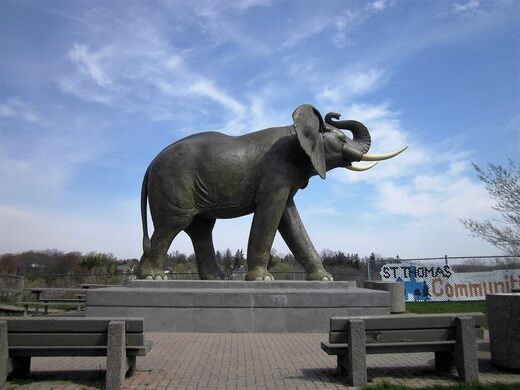 Please log in to see the coordinates.
Please log in to see the coordinates.
 Cache attributes
Cache attributes







 Description
EN
Description
EN
To Claim this Virtual have your picture tken with the Statue
On September 15, 1885 Jumbo the Elephant was in St. Thomas, Ontario on tour with the Barnum & Bailey Circus. One night after the show, the world-famous pachyderm was being brought back to the circus train. Suddenly, out of the dark, came an unexpected freight train barreling down the tracks headed straight for Jumbo. With neither time nor luck on his side, he was struck and killed.
In 1985, 100 years after Jumbo’s tragic death, this life-size concrete statue was installed by the city of St. Thomas in commemoration of the great elephant, arguably the most renowned circus animal of all time. At 138 tons, it is the biggest of the big concrete statues created by a mid-20th century Canadian folk-sculptor named Winston Bronnum, known for his skill in molding wire and concrete into life-like horses, enormous lobsters, and towering moose.
When Jumbo came to St. Thomas he was a huge attraction for the circus (literally and figuratively), and had been setting attendance records since his early days in Paris and London. He became a circus performer via P.T. Barnum himself, purchased from the London Zoo and ferried over the Atlantic with a reputation as a gentle giant and lover of children. He joined Barnum & Bailey with enormous fanfare, was met everywhere by enormous crowds, and generated enormous profits for the famous showman.
After Jumbo’s untimely death, never missing an opportunity to make some serious box office, Barnum had the elephant’s body sent to Tufts College (now University) to have his skeleton preserved and the rest of him taxidermied. Barnum & Bailey continued to tour with a stuffed Jumbo and his articulated frame. Once retired from the circus, the stuffed Jumbo was on display for 86 years in Barnum Hall of Tufts College until April 14, 1975 when both Jumbo and the building were consumed in an electrical fire. Some of Jumbo’s ashes were recovered and remain stored in a peanut butter jar kept in the athletics director’s office. Tuft’s athletics adopted the mascot and to this day their teams are known as the Jumbos.
It would be easy to assume that Jumbo was named “Jumbo” because he was so large. At over 13 feet he was definitely tall for an African elephant, but it was the other way around. His name—thought to derive from the Swahili word “jambo” for “hello”, or “jumbe” for “chief” or “boss”—came before “jumbo” was slang word for huge. The word that today is used to describe everything from giant shrimp to oversized paper towel rolls comes from the boss elephant himself.

 |
 Log entries:
Log entries:
 2x
2x
 0x
0x
 0x
0x




 Rated as: n/a
Rated as: n/a





